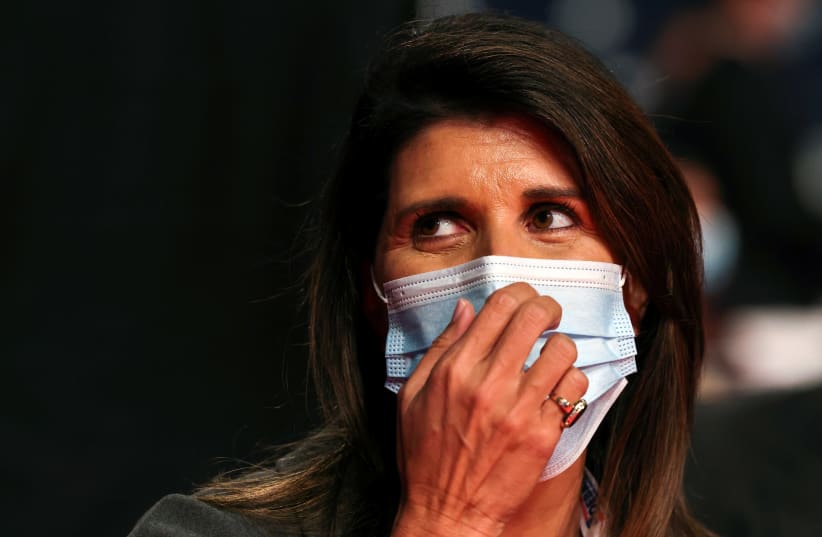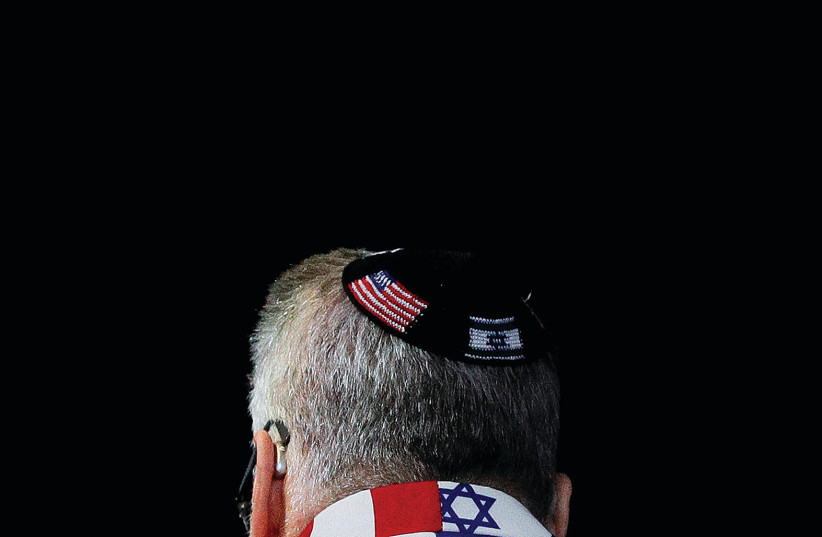The American Israel Public Affairs Committee (AIPAC) is no stranger to attacks.
It is regularly slandered by antisemites on the Right who say it is controlling Washington and is proof that American Jews have dual loyalties, and by antisemites on the Left who say it bribes Congress in order to uphold a racist, apartheid, ethnic cleansing regime – Israel.
In 2007 two well-known political scientists, Stephen Walt and John Mearsheimer, wrote The Israel Lobby and US Foreign Policy claiming that AIPAC had done nothing less than hijack US foreign policy, often to the detriment of US national security.
In 2019 then-presidential candidate Bernie Sanders pandered to the far-left of the Democratic party and refused to attend AIPAC’s annual conference because, he said, it provides a platform for “leaders who express bigotry and oppose basic Palestinian rights.”
And that is all from the general population.
Among the Jews, there are those on the Left who say that it is too deeply in the pocket of the Likud and Republicans, and there are those on the Right who say it is too mealy-mouthed and not strong enough in its support of Israel and against proposals such as a two-state solution and the Iranian nuclear deal.
In 2007, the late Sheldon Adelson formed the American Israel Council and broke away from AIPAC because it backed then-president George W. Bush’s Annapolis process A decade later Adelson explained his creation of the new group as a result of wanting an organization that would be an “unequivocal support organization for Israel. There’ll be no political correctness, there’ll be no questions about whether we can keep the White House door open to us.”
On the other side of the political spectrum, the left-wing J Street was established in 2008 because its founders were keen on a counterweight to AIPAC.
Over its long history, AIPAC has become accustomed to the background noise, has come to expect being slammed from every conceivable direction, yet continues to carry on.
On Sunday, however, the organization was slammed from a most unlikely corner: Nikki Haley, the former US ambassador to the UN who has been the darling – nay, the rock star – of recent AIPAC annual conventions (because of COVID-19 the group has not held its annual policy conference since 2020, and is not planning one in 2022 either).
Haley won over the 2017 AIPAC policy conference, shortly after taking up her post at the UN, when she pledged to fight against the anti-Israel bias in the UN, and memorably said, “I wear heels – It’s not for a fashion statement, it’s because if I see something wrong, we’re going to kick ’em every single time.”
But speaking in Las Vegas at an annual convention held by the Republican Jewish Coalition, another organization backed by Adelson, Haley opted this time to kick AIPAC, opening her speech by sharply criticizing the lobby for what she said was placing too much emphasis on bipartisanship.
While saying that she “loved” AIPAC, she added: “But there’s one thing I don’t get, and I’m not saying anything to you that I have not said to their leaders. Why do they invite politicians to their conference who strongly support the Iran nuclear deal?”
Her words were greeted with applause by an audience that undoubtedly included many who, like Adelson, do not feel AIPAC is right-wing enough.
“I want all Democrats to support Israel as much as Republicans,” she said. “But if you make bipartisanship the whole reason for existence, then you lose sight of the policies you’re fighting for in the first place.
“I have spoken at AIPAC events many times and they’ve been unbelievably supportive to me,” she said. “If a politician supports the disastrous Iran deal, opposes moving the American embassy to Jerusalem and is embraced by antisemites who support the BDS movement, then your pro-Israel group should have absolutely nothing to do with him.”
This criticism, however, is largely unfair to AIPAC.
First of all, AIPAC’s “reason for existence” is not bipartisanship. Rather its raison d’etre is to strengthen the US-Israel relationship, and what the organization has found in its 58 years of existence is that the best way – the most successful way – to do that is by mining bipartisan support.
American support for Israel is critical, both militarily and diplomatically. And that support is not now – nor has it ever – been a given. Realizing that politics is cyclical, that one day the US Congress will be controlled by the Democrats, and the next day by the Republicans; that one year there will be a Democratic president, and four or eight years later a Democratic one; means that it is crucial to have the support of both parties.
AIPAC is not sanctifying bipartisanship for its own sake, which Haley implied, rather it realizes that this approach best serves the Israel-US relationship.
This is something that the political parties in Israel need to realize as well. There is currently a great deal of talk – and Foreign Minister Yair Lapid is leading the chorus – about the need for Jerusalem to build bridges with the Democratic party, both because of the rise of the progressives inside the party, and also because the Democrats now control both Congress and the presidency.
But this will not always be the case. When prime minister Benjamin Netanyahu cultivated close ties with President Donald Trump and the Republican congressional leadership, he was often criticized for getting too close to the Republicans, who – his critics often said – would not be in power forever.
The same can be said now of the Democrats. There are those who advocate paying more attention to liberals and progressives, and less attention to the Republican evangelicals. But following last Tuesday’s off-year election results, chances are looking pretty good that the Republicans, not the Democrats, will be in control of the House of Representatives after next year’s midterm election.
What this means is that both parties need to be cultivated, that outreach needs to be made to both of them – something that AIPAC has long understood.
Haley, a leading light in the Republican firmament, obviously would like to see AIPAC not give Democratic politicians a platform, something that would help create the perception that the Republicans are the pro-Israel party, while the Democrats are not.
But the reality is more nuanced and complex.
Haley asked why AIPAC invited politicians to their conference who strongly supported the Iran nuclear deal. Why? Because backing that deal – as mistaken as that position might have been – does not make a politician anti-Israel, and if AIPAC canceled all the politicians who supported President Barack Obama on the Joint Comprehensive Plan of Action, as the deal is formally known, the organization would be losing a lot of supporters for other issues for which it lobbies.
AIPAC has enough detractors gunning for it as it is. Did the staunchly pro-Israel Haley, whose political ambitions have only been helped by her appearances at AIPAC events over the last few years, really need to pile on?

